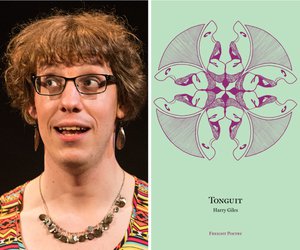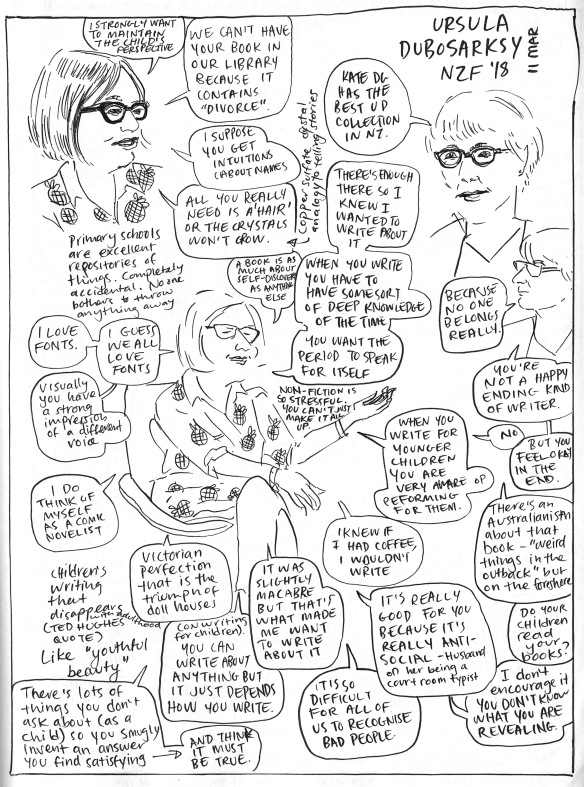Tara Black reviews Charlie Jane Anders – Beautiful Fantasy, and below that – Elizabeth Heritage also reviews it, with lots more words! They both did beautifully!

A small but devoted crowd turned out this morning in the festival tent to hear Christchurch spec fic writer AJ Fitzwater interview Charlie Jane Anders. Anders is a transgender speculative fiction writer and organiser from the US: ‘willing to be a bad influence for a good cause’. It was very pleasing to see two women on stage each with pink hair (I may be a little biased).
Negotiating stereotypes and tropes is a topic that often comes up in conversations about spec fic, and that’s where we started. Anders talked about how the stereotype is that science fiction is masculine, and fantasy is feminine. Often a fantasy character will say to a sci fi character, “this is something you can’t possibly understand” – ‘for a man to say that to a woman just bugs the hell out of me’. In Anders’ novel All the Birds in the Sky, Laurence, the male character who is a computer scientist, ‘cries early and often’. He’s less sexist than many techy guys and ‘that made me like him more – and I really wanted to like him.’
All the Birds in the Sky follows the two central characters from when they are children. Anders said she wanted to honour that teens are often more introspective and noodly than adults. ‘I was much more articulate at the age of 13 than I am now. I talked like a college professor because my parents were college professors. 13 was the age that nearly wiped me off the face of the earth.’
Anders was learning disabled as a child: ‘I couldn’t make words on paper’. She was helped by a teaching assistant with whom she is still friends. https://www.buzzfeed.com/charliejane/how-being-a-special-ed-student-turned-me-into-a-lifelong-wri?utm_term=.wsgWWE3rRB#.kjrJJlDyBZ She said if she writes disabled characters she will always take care to do so mindfully.
Anders and Fitzwater had a great rapport on stage, which always makes a difference: at one point Anders commented ‘these are the best questions ever!’ One of her questions was in relation to the late, great Ursula K. Le Guin – what do we owe Le Guin to do now?
Anders said her next novel that comes out in January 2019 is Le Guin fan-fiction, and she’s sad she’ll never get to show it to her. What we owe Le Guin to do now is to approach gender in books mindfully, and to think about the ways in which societies are not just mechanistic. Cultures are made up of more than just what’s on the surface: historical accidents, folklore, deep history.
Fitzwater asked about Anders’ short story “Don’t Press Charges and I Won’t Sue”, a terrifying dystopian tale of forced de-transition. Anders said: ‘I tweeted out a trigger warning for that story, which I don’t usually do. The story came out of just sheer terror. I wrote it around the time of the [US presidential] inauguration, and I was freaking out. You could already see the wave coming.’ It was published in the Boston Review. Anders said she wanted to get that story into a fancy literary magazine because she wanted nice, well-meaning cis-gender people to face the terror of violent transphobia and have a moment of sitting with that.
‘I wanted to grab cis people by the lapels and make them listen to my fear.’ Trans people are not ‘some monstrous creature from your id coming into your bathroom scaring your kids’. She has had feedback from readers that it has been opening some people’s minds.
Discussion turned to the theme of climate change. Anders said: ‘If you’re writing about the future and you’re not including climate change then you’re shirking your duty.’ She said you have to face up to the scale of the problem without getting defeatist.
‘Environmentalism can get a bit puritanical, like humans are just bad.’ But that isn’t helpful: you need to focus on solutions. ‘How the hell are we going to get rid of cars and bitcoin?’ She recommended that spec fic writers talk to scientists to help get it right.
The City in the Middle of the Night, the sequel to All the Birds in the Sky, comes out in January 2019.
Picture by Tara Black, words by Elizabeth Heritage


 Poetry International was inspired by the
Poetry International was inspired by the 


 Dr Charlie Corke’s book Letting Go is a powerful book about how we handle these final moments of our life. Dr Corke is a career-long intensive care specialist, and he wrote the book to fill a gap for those sitting with their dying loved ones in their final moment. He notes later ‘I got into it for the machines when I was young, and as I got older I became more thoughtful.’
Dr Charlie Corke’s book Letting Go is a powerful book about how we handle these final moments of our life. Dr Corke is a career-long intensive care specialist, and he wrote the book to fill a gap for those sitting with their dying loved ones in their final moment. He notes later ‘I got into it for the machines when I was young, and as I got older I became more thoughtful.’ Rodger is known for his work as a playwright. He said he wanted to be an actor as a child, but after hearing Kirk Douglas say ‘there are no roles for fat leading men’, he changed his career trajectory and focussed on writing. He had ‘a fire to tell the story’ of his tumultuous relationship with his father, who he never lived with. His Samoan father left his Palagi mother when she was a pregnant 15yo. ‘I couldn’t respect him even though I came to love him in my own way.’
Rodger is known for his work as a playwright. He said he wanted to be an actor as a child, but after hearing Kirk Douglas say ‘there are no roles for fat leading men’, he changed his career trajectory and focussed on writing. He had ‘a fire to tell the story’ of his tumultuous relationship with his father, who he never lived with. His Samoan father left his Palagi mother when she was a pregnant 15yo. ‘I couldn’t respect him even though I came to love him in my own way.’

